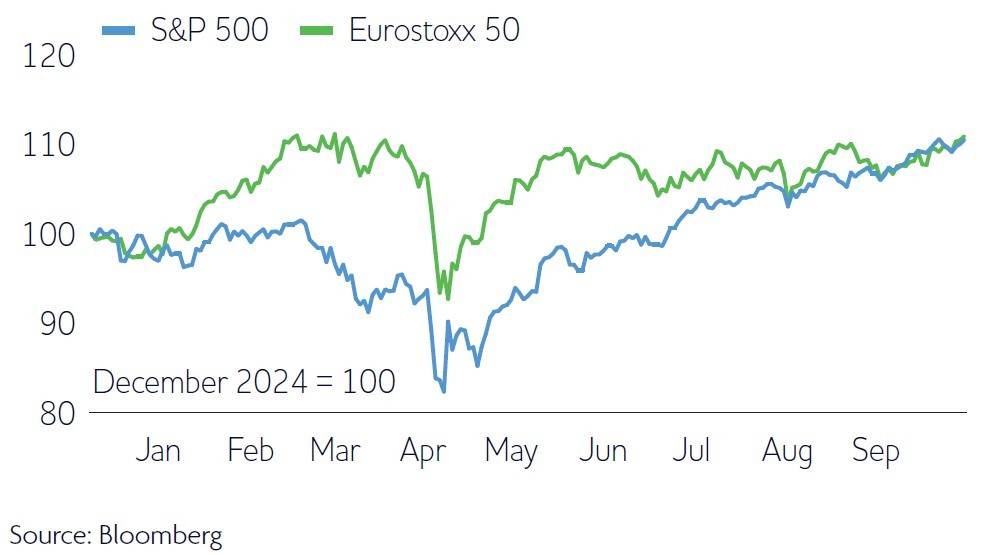Market Update - October 2025
Equities rise despite economic headwinds
The US Federal Reserve cut rates for the first time this year against signs of a cooling labour market
Market strength
Global stocks were lifted after the US Federal Reserve (Fed) reduced interest rates by a quarter percentage point, bringing them down to a range of 4% to 4.25% – the first cut this year. It is the lowest level since early 2023, and Fed officials indicated that further cuts are likely in the months ahead.
Meanwhile, inflation has been creeping up. Since April, when Trump announced his reciprocal tariffs, inflation has risen from 2.3% to 2.9% in August. This is well above the Fed's 2% target. After Trump's tariffs took effect in August, most goods entering the US faced taxes of between 10% and 50%. Economists have warned that inflation could become more pronounced in the coming months once companies start passing on the costs of tariffs to consumers.
The US economy remains resilient, even as the labour market shows signs of slowing. Just 22,000 jobs were created in August, bringing the total for the year to 598,000 – well below the 1.4 million recorded over the same period in 2024. Even so, unemployment is historically low at 4.3% and layoffs have been limited. Corporate earnings have also held up well, with more than 80% of companies surpassing revenue forecasts in the third quarter.
UK inflation holds steady
It was a mixed month for UK stocks, with weak economic data dampening investor sentiment. UK inflation remains stubborn, holding at 3.8% in August, though food prices rose for a fifth consecutive month. The labour market is showing signs of weakening following April's increase in employer National Insurance contributions, which analysts suggest has dampened hiring. Unemployment rose to 4.7% between May and July, the highest level in four years.
The Bank of England held interest rates at 4% as it blamed the government for contributing to recent increases in inflation. It also announced it was scaling back the rate at which it is selling bonds into the financial market. The government is facing increasing pressure over its handling of the economy, with speculation mounting that tax rises could be announced in the Autumn Budget. Sluggish growth and rising borrowing costs have made it harder to meet fiscal targets.
Political instability in France
France was thrown into a fresh political crisis after Prime Minister François Bayrou lost a confidence vote on the government's debt-reduction plans. He was replaced by Sébastien Lecornu, a close ally of Emmanuel Macron.
Meanwhile, European stocks rallied in response to the Fed's rate cut, with tech and bank shares leading. The European Central Bank (ECB) held its main policy rate at 2% for the third consecutive month. Annual inflation in the eurozone held steady at 2% in August. Eurozone business activity rose to its highest level in 16 months in September, despite persistent economic weakness in France. Germany's service activity picked up significantly, while job numbers remained flat.
China's economy is showing signs of weakening amid strain from Trump's trade wars, with factory output and consumer spending rising at their slowest pace for a year. Industrial output grew by 5.2% year on year in August, down from 5.7% the previous month, while retail sales expanded 3.4%, down from 3.7% in July. Deflationary pressures also persisted, with the consumer price index falling 0.4% from a year earlier after being flat in July. Even so, Chinese equities have continued to rally, supported by strong domestic household investment.
Figure 1: US vs European equities in 2025
US stocks recover early losses to match European performance

Download Omnis Market Update (.pdf)

